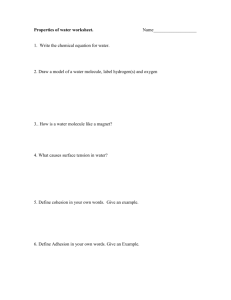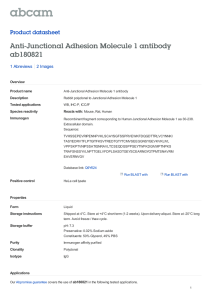Anti-Junctional Adhesion Molecule 1 antibody [H202-
advertisement
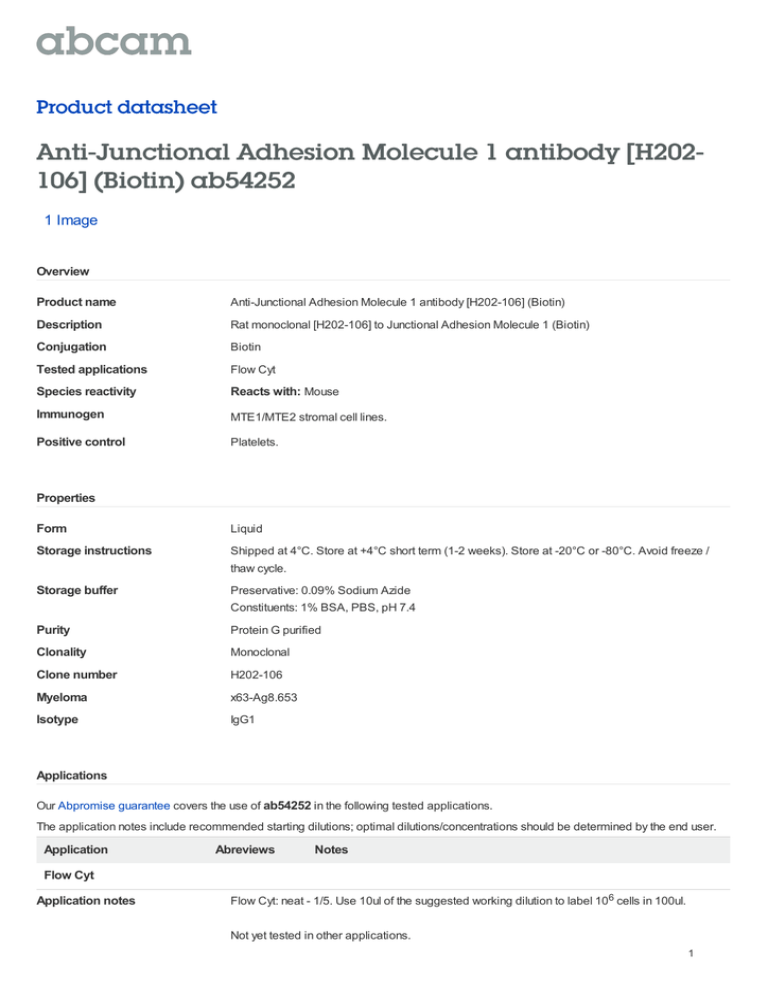
Product datasheet Anti-Junctional Adhesion Molecule 1 antibody [H202106] (Biotin) ab54252 1 Image Overview Product name Anti-Junctional Adhesion Molecule 1 antibody [H202-106] (Biotin) Description Rat monoclonal [H202-106] to Junctional Adhesion Molecule 1 (Biotin) Conjugation Biotin Tested applications Flow Cyt Species reactivity Reacts with: Mouse Immunogen MTE1/MTE2 stromal cell lines. Positive control Platelets. Properties Form Liquid Storage instructions Shipped at 4°C. Store at +4°C short term (1-2 weeks). Store at -20°C or -80°C. Avoid freeze / thaw cycle. Storage buffer Preservative: 0.09% Sodium Azide Constituents: 1% BSA, PBS, pH 7.4 Purity Protein G purified Clonality Monoclonal Clone number H202-106 Myeloma x63-Ag8.653 Isotype IgG1 Applications Our Abpromise guarantee covers the use of ab54252 in the following tested applications. The application notes include recommended starting dilutions; optimal dilutions/concentrations should be determined by the end user. Application Abreviews Notes Flow Cyt Application notes Flow Cyt: neat - 1/5. Use 10ul of the suggested working dilution to label 106 cells in 100ul. Not yet tested in other applications. 1 Optimal dilutions/concentrations should be determined by the end user. Target Function Seems to plays a role in epithelial tight junction formation. Appears early in primordial forms of cell junctions and recruits PARD3. The association of the PARD6-PARD3 complex may prevent the interaction of PARD3 with JAM1, thereby preventing tight junction assembly (By similarity). Plays a role in regulating monocyte transmigration involved in integrity of epithelial barrier. Involved in platelet activation. In case of orthoreovirus infection, serves as receptor for the virus. Sequence similarities Belongs to the immunoglobulin superfamily. Contains 2 Ig-like V-type (immunoglobulin-like) domains. Post-translational modifications N-glycosylated. Cellular localization Cell junction > tight junction. Cell membrane. Localized at tight junctions of both epithelial and endothelial cells. Anti-Junctional Adhesion Molecule 1 antibody [H202-106] (Biotin) images ab54252 used neat staining Junctional Adhesion Molecule 1 in platelets by Flow Cytometry. Flow Cytometry - Junctional Adhesion Molecule 1 antibody [H202-106] (Biotin) (ab54252) Please note: All products are "FOR RESEARCH USE ONLY AND ARE NOT INTENDED FOR DIAGNOSTIC OR THERAPEUTIC USE" Our Abpromise to you: Quality guaranteed and expert technical support Replacement or refund for products not performing as stated on the datasheet Valid for 12 months from date of delivery Response to your inquiry within 24 hours We provide support in Chinese, English, French, German, Japanese and Spanish Extensive multi-media technical resources to help you We investigate all quality concerns to ensure our products perform to the highest standards If the product does not perform as described on this datasheet, we will offer a refund or replacement. For full details of the Abpromise, please visit http://www.abcam.com/abpromise or contact our technical team. Terms and conditions 2 Guarantee only valid for products bought direct from Abcam or one of our authorized distributors 3
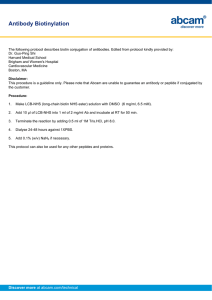
![Anti-CD200R antibody [MRC OX102] (Biotin) ab34098 Product datasheet Overview Product name](http://s2.studylib.net/store/data/012448001_1-b7671e99fc41fc1a620dab0994cc5ef3-300x300.png)
![Anti-MHC Class I H2 Dk antibody [15-5-5.3] (Biotin)](http://s2.studylib.net/store/data/012444100_1-e7a75ab4b3fba9ac97115e2c07d89c3c-300x300.png)
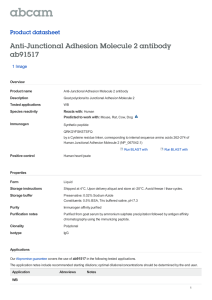
![Anti-NrCAM antibody [MM0495-8E25] ab89881 Product datasheet Overview Product name](http://s2.studylib.net/store/data/012545675_1-2e9f747565fe1bc60077491e2c099335-300x300.png)
![Anti-Junctional Adhesion Molecule 1 antibody [EP1042Y] ab52647](http://s2.studylib.net/store/data/012747576_1-fb5b4cc9050e9e657d6c0f37d019eac8-300x300.png)
